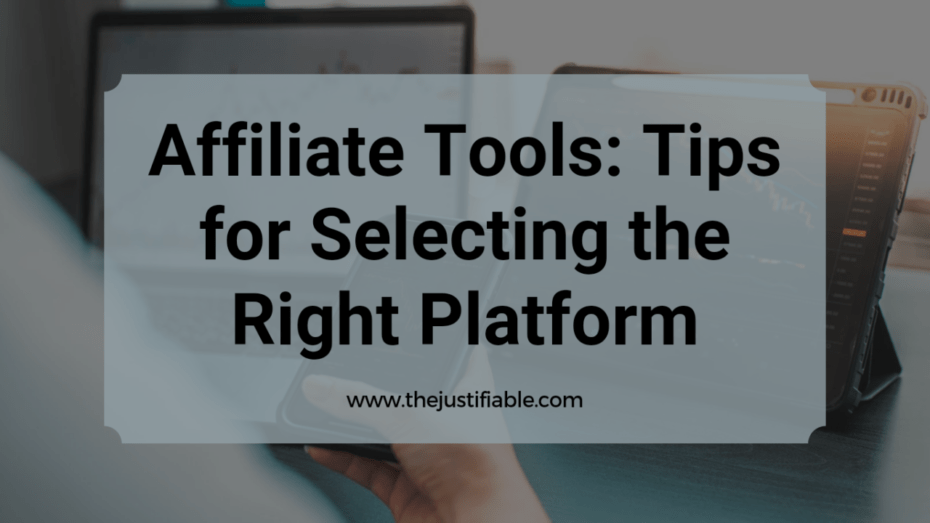Disclosure: This post contains affiliate links, which means that if you click on them and make a purchase, I will receive a commission. Read our Disclaimer for More.
Affiliate tools!
In today’s fast-paced digital ecosystem, the tools we choose can greatly influence our success trajectory. This is especially true for affiliate marketing, an industry that has been dynamically evolving since its inception. For those aiming to scale their efforts, drive tangible results, and foster strong partnerships, the right affiliate tools are not just a convenience; they’re a necessity.
Navigating the maze of available affiliate tools can be a daunting task. Each platform, tool, or software presents its unique set of capabilities, designed to cater to varying needs and niches within the affiliate marketing world.
Some tools specialize in tracking and analytics, while others excel in campaign management or partner communication. Then, there are the all-in-one solutions attempting to be a jack-of-all-trades. The sheer diversity can be overwhelming, making the selection process feel like looking for a needle in a haystack.
Understanding Affiliate Tools
As the digital landscape continues to evolve, affiliate marketing stands out as a proven method for driving sales and generating passive income. Central to the effectiveness of this strategy are affiliate tools, the software and platforms that underpin these marketing efforts.
Delving into their definition, history, and significance helps decode their growing importance in today’s marketing paradigm.
What Are Affiliate Tools?
Affiliate tools can be best understood as a collection of software and platforms tailored to facilitate, monitor, and optimize affiliate marketing campaigns. At their core, these tools help marketers connect with affiliate partners, track sales or actions, and evaluate the performance of their efforts.
Tracing back to the early days of the internet, affiliate marketing was a nascent concept where websites would simply refer visitors to products or services and earn a commission on successful conversions. Back then, rudimentary tracking methods like cookies were used, and the landscape was largely unstructured.
But as the potential of affiliate marketing became evident, the demand for more sophisticated tools grew. This birthed the first-generation affiliate platforms and software, focused primarily on tracking and payment.
Fast forward to today, affiliate tools encompass a wide array of functionalities: from advanced analytics to automation features, all aimed at addressing the complexities of modern digital marketing. They have become vital assets in allowing marketers to keep pace with real-time data, discern audience behavior, and craft strategies that resonate.
Why Are They Essential for Marketers?
The digital age is characterized by information overload. For marketers, sifting through this deluge of data without the right tools is akin to finding a needle in a haystack. Advanced affiliate tools provide the precision, efficiency, and insights necessary for campaigns to thrive in this competitive environment.
One of the primary advantages of using cutting-edge affiliate tools lies in their ability to offer granular insights. Marketers can pinpoint which strategies are yielding results, which affiliate partners are driving the highest conversions, and which products or services resonate most with the target audience. This level of detail isn’t just about number-crunching; it’s about crafting informed strategies that yield higher ROI.
Moreover, affiliate tools play a pivotal role in campaign management. With multiple affiliates, diverse platforms, and varying commission structures, overseeing such campaigns manually is an arduous task. Modern tools automate much of this process, ensuring that campaigns run smoothly, payments are made promptly, and performance metrics are consistently monitored.
Key Features to Look for in Affiliate Tools
As affiliate marketing becomes more sophisticated, the tools designed to support it need to meet a myriad of demands. From ease of use to detailed analytics, there’s a vast spectrum of functionalities that these tools must encompass. But amidst the noise, which features genuinely count? Let’s delve deep into the indispensable attributes every top-tier affiliate tool should possess.
User-Friendliness
In the vast world of software, an intuitive interface stands out as the unsung hero. For affiliate tools, this trait is no less vital. But why is user-friendliness so crucial?
Firstly, an intuitive interface ensures that you spend less time grappling with the software and more time leveraging its features for your campaign’s benefit. Every moment saved from unnecessary clicks or confusing navigation translates to more time optimizing and strategizing.
Furthermore, the learning curve associated with any tool is inversely proportional to its user-friendliness. A steep learning curve can delay campaigns, lead to potential mismanagement due to misunderstandings, and even deter users from harnessing the tool’s full potential. In contrast, a user-friendly tool promotes rapid onboarding, ensuring that even novices can get up to speed swiftly.
Comprehensive Reporting
In the age of data, insights are the marketer’s compass. Comprehensive reporting isn’t just a feature; it’s a necessity.
An affiliate tool that provides deep insights into performance metrics – from click-through rates to conversion ratios – can be the difference between a good campaign and a great one. Such granularity allows for precision in tweaking strategies, understanding audience behavior, and maximizing ROI.
But it’s not just about the depth; it’s about the timeliness. Real-time data and analytics ensure that marketers are always operating with the most current information. This is crucial for rapid response to emerging trends, anomalies, or opportunities, allowing campaigns to stay agile and relevant.
Payment Integration Options
With affiliate marketing’s global nature, accommodating various payment gateways becomes indispensable. A tool that offers diverse payment integration options ensures that you can cater to affiliates from different geographies without hitches.
More than convenience, this feature is about trust. Ensuring secure transactions not only safeguards your funds but also strengthens the bond with your affiliates. They need to know that their earnings are secure and that they’ll be paid promptly and efficiently. A tool that prioritizes secure payment integrations underlines this commitment.
Scalability
The business world is dynamic, and today’s small campaigns might evolve into tomorrow’s vast networks. Hence, the affiliate tools of choice must be scalable.
Choosing a scalable tool means you won’t have to migrate to a new platform or overhaul your systems as your business grows. This not only saves time but also reduces the potential for disruptions or data loss.
Moreover, considering future growth when selecting a tool underscores a forward-thinking approach. It’s about being prepared for success and ensuring that when expansion beckons, your tools aren’t the limiting factor but the facilitating force.
Tips for Selecting the Right Platform
As affiliate marketing continues to expand its foothold in the digital space, the tools supporting it have proliferated. This abundance, while advantageous, can also be overwhelming. With numerous platforms vying for attention, how does one discern the best fit? Let’s delve into strategic tips that can guide you in selecting the ideal affiliate platform for your needs.
Determine Your Specific Needs
Before diving into the vast ocean of affiliate platforms, it’s imperative to first anchor oneself to clear objectives. Start by assessing your individual and business goals. Are you looking to manage a vast network of affiliates, or are you starting small? Do you prioritize detailed analytics, or is ease of payment your main concern?
Once these objectives are mapped out, it becomes exponentially easier to sieve through the myriad of tools available. You can then match platform features to your identified needs. This tailored approach ensures you’re not swayed by flashy functionalities that may be superfluous for your goals. Instead, you invest in features that directly align with and support your affiliate marketing vision.
Seek Recommendations and Reviews
In a world where experiences are openly shared, leveraging the wisdom of the crowd can be invaluable. Dive into user reviews and expert opinions to gauge the real-world performance of prospective platforms.
User reviews provide candid insights into the day-to-day operability of the tool, highlighting both its strengths and potential pitfalls. Meanwhile, expert opinions often delve into technical aspects, comparing features and offering a more holistic view of how a platform stacks up against its competitors.
By studying both, you can discern patterns. Are there certain platforms that consistently earn praise? If so, what attributes make them preferred choices? This dual perspective, of users and experts, ensures a balanced and informed selection.
Consider the Pricing Model
Price is often a decisive factor, but it’s essential to view it in light of value. Affiliate platforms come with varied pricing structures: from freemium models that offer basic functionalities for free, to subscription-based plans, to one-time fee structures.
While initial costs are undoubtedly important, one should also evaluate the long-term value and potential return on investment (ROI). For instance, a slightly pricier platform that offers comprehensive features might save costs in the long run by negating the need for additional tools.
Furthermore, consider the flexibility of the pricing model. As your affiliate marketing efforts grow, can the platform accommodate that growth without exorbitant cost hikes?
Test the Customer Support
Even the most intuitive platforms can pose challenges or glitches. In such instances, responsive and efficient customer support becomes the lifeline.
Before committing to a platform, test out their support channels. How quickly do they respond? Is their assistance clear and constructive? A platform backed by stellar support not only ensures smoother day-to-day operations but also signals the company’s commitment to its users.
In the long run, the quality of customer support can significantly impact user experience, influencing whether you stick with a platform or seek alternatives.
Top Affiliate Tools to Consider in 2023
Affiliate marketing’s dynamic realm has witnessed a plethora of tools aiming to streamline and optimize campaigns. As 2023 unfolds, a few platforms have emerged as market leaders, each bringing its unique strengths and potential limitations. Let’s dive deep into some of these front-runners, shedding light on what sets them apart and the considerations to keep in mind when opting for them.
Tool #1: AffTrack
Introduction: A cloud-based solution, AffTrack offers unparalleled click tracking, making it a favorite among seasoned affiliate marketers. It’s tailored for those who prioritize precise analytics.
- Pros:
Real-time Analytics: AffTrack’s data analytics are in real-time, enabling immediate insights and swift campaign adjustments.
Unlimited Affiliates: Unlike some platforms with restrictions, AffTrack allows unlimited affiliates, making it suitable for expansive campaigns.
Fraud Detection: Its built-in fraud detection mechanism ensures campaign integrity.
- Cons:
Learning Curve: New users might find it slightly complex initially.
Pricing: Higher-tier features come at a premium, which might be a barrier for small-scale marketers.
Tool #2: Post Affiliate Pro
Introduction: Serving businesses of all sizes, Post Affiliate Pro is renowned for its robust feature set and intuitive interface, striking a balance between depth and usability.
- Pros:
Customizable Interface: Users can tailor the dashboard to their preferences, making navigation seamless.
Extensive Integrations: Integrates effortlessly with most eCommerce platforms and payment gateways.
Reliable Tracking: Utilizes multiple tracking methods to ensure accuracy.
- Cons:
Setup Time: Some users report initial setup to be time-consuming.
Advanced Features Complexity: While basic functionalities are easy to grasp, the advanced features may require training.
Tool #3: LeadDyno
Introduction: A newcomer that’s rapidly gained traction, LeadDyno stands out for its simplicity and efficient affiliate management system, catering especially to businesses new to affiliate marketing.
- Pros:
Easy Onboarding: Its user-friendly interface ensures a minimal learning curve for new marketers.
Automated Affiliate Signup: Streamlines the process of adding new affiliates, saving time.
Social Media Sharing: In-built tools make social media promotions a breeze.
- Cons:
Limited Advanced Analytics: Might not cater to marketers seeking in-depth data insights.
Scaling Concerns: Larger affiliate programs might find certain features restrictive.
Tool #4: TUNE (formerly HasOffers)
Introduction: A stalwart in the affiliate space, TUNE is celebrated for its flexibility, catering to both budding entrepreneurs and large enterprises with its comprehensive toolkit.
- Pros:
Highly Customizable: Offers a wide array of customization options to suit varied needs.
API Access: Advanced users can tap into the platform’s API for further integrations and functionalities.
Global Reach: Supports multiple currencies and languages, catering to a global audience.
- Cons:
Costly for Startups: The premium features, while powerful, come at a significant cost.
Complexity: Its vast feature set can be overwhelming for some, especially those new to affiliate marketing.
In conclusion, 2023 presents a bouquet of affiliate tools, each resonating with distinct segments of the marketing community. Whether you prioritize detailed analytics, user-friendliness, or scalability, there’s a tool tailored for your needs. The key lies in aligning your choice with your objectives, ensuring a harmonious blend of capabilities and usability.
Conclusion
As the digital horizon expands, the domain of affiliate marketing undeniably follows suit. Amidst this growth, the emphasis on having the right set of affiliate tools in one’s arsenal cannot be stressed enough. Just as a master craftsman relies on precision instruments, a skilled affiliate marketer’s prowess is magnified manifold with the right platforms supporting their endeavors.
Selecting the most appropriate affiliate tool is not merely a question of convenience; it’s a decision that can be a fulcrum for success. The right platform can seamlessly harmonize with your objectives, amplifying efforts, and driving measurable results. On the contrary, an ill-fitted tool can prove to be a cumbersome impediment, diluting efforts and diverting valuable resources.
Thus, while the allure of quick decisions is often tempting, especially in a fast-paced digital world, the adage ‘haste makes waste’ holds profound relevance here. An investment of time in meticulous research before committing to a platform can be the very distinction between transient efforts and sustained success.






